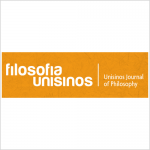Transcendent and Immanent Eternity in Anselm’s Monologion
Vol 11, No 3 (2010) • Filosofia Unisinos - Unisinos Journal of Philosophy
Autor: Lesley-Anne Dyer
Resumo:
This article argues that the signifi cance of Anselm’s contribution to the concept of Eternity as a divine attribute is his well-articulated conception of it as “Maximum”, connecting it to the logic of simplicity. The beginning of this article reviews the ongoing debates over Anselm’s idea of timeless Eternity, including the work of Pike, Leftow, and Rogers. By contextualizing Anselm’s work in light of his textual sources, including Augustine, Boethius, and possibly Hilary of Poitier, it clarifi es the exact ways Anselm moved the conversation of his time forward. It then analyzes the role Eternity plays in the structure of the Monologion, suggesting that Anselm saw that the metaphor of “containment” was enfolded within notions of “presence.” In order to preserve God’s transcendence and immanence, Anselm argues for a kind of presence that does not imply containment based upon ideas of divine Maximum.
ISSN: ISSN: 1984-8234
Texto Completo: http://revistas.unisinos.br/index.php/filosofia/article/view/4651
Palavras-Chave: Anselm,Boethius,Augustine,De Trinitate, Hilar

Filosofia Unisinos - Unisinos Journal of Philosophy
The journal Filosofia Unisinos - Unisinos Journal of Philosophy is published once every four months by Universidade do Vale do Rio dos Sinos.
Articles must be original, unpublished, and not under consideration for publication anywhere else and can be written in Portuguese, English or Spanish
Filosofia Unisinos - Unisinos Journal of Philosophy prints articles, translations and critical book reviews. It also reprints papers that are considered fundamental to the area when authorized written permission is given by the original publisher.
